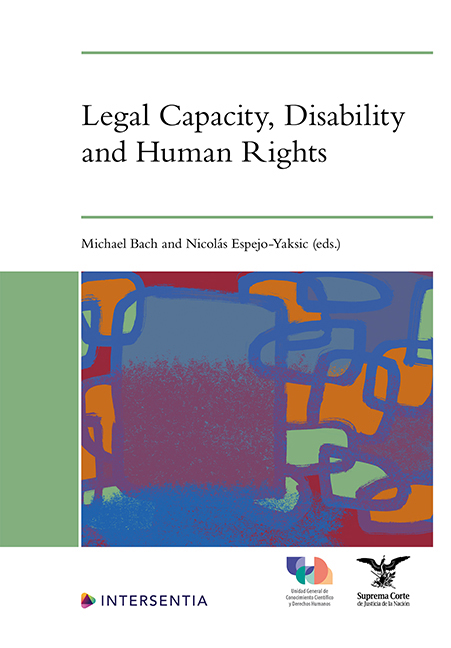Book contents
- Frontmatter
- Foreword
- Acknowledgements
- Contents
- List of Cases
- List of Contributors
- Legal Capacity, Disability and Human Rights: Introduction
- PART I HISTORICAL PERSPECTIVES AND THEORETICAL FRAMES
- PART II LAW REFORM: COUNTRY AND REGIONAL PERSPECTIVES
- PART III LEGAL QUESTIONS, PERSISTENT CHALLENGES
- Index
- About the Editors
Safeguards for the Exercise of Legal Capacity by Persons with Disabilities: A Form of Justified Paternalism
Published online by Cambridge University Press: 03 April 2024
- Frontmatter
- Foreword
- Acknowledgements
- Contents
- List of Cases
- List of Contributors
- Legal Capacity, Disability and Human Rights: Introduction
- PART I HISTORICAL PERSPECTIVES AND THEORETICAL FRAMES
- PART II LAW REFORM: COUNTRY AND REGIONAL PERSPECTIVES
- PART III LEGAL QUESTIONS, PERSISTENT CHALLENGES
- Index
- About the Editors
Summary
INTRODUCTION
Article 12 of the Convention on the Rights of Persons with Disabilities (UNCRPD) revolutionised the understanding of the capability of persons with disabilities, particularly persons with intellectual and psychosocial disabilities, to engage in juridical acts. They are no longer seen as incapable, but rather enjoy legal capacity on equal terms with others. The literature on the subject has focused on equal legal capacity and the role of supports for the exercise of legal capacity. However, few studies analyse the scope of Article 12.4 of the UNCRPD.
For a long time, one of the primary arguments to deny legal capacity to persons with disabilities was that they did not have the capacity to make relevant decisions and, therefore, should not bear the negative consequences of their actions. As such, it was better for someone else to make decisions on their behalf. In this regard, one of the clearest demands during negotiation of the UNCRPD was the freedom to make mistakes and take risks in decision-making, on the understanding that this was intrinsically related to human dignity.
For persons with disabilities to be able to make their own decisions obviously implies accepting that there will be times when they will make decisions that may appear to go against their interests, be risky or even dangerous. However, this “ freedom to make one's own decisions” can also be an invitation to take advantage of a situation of vulnerability. Any such outcome would undermine respect for the “inherent dignity” of the person with a disability. Article 12.4 of the UNCRPD confronts this tension by establishing safeguards, intended to prevent protections for the exercise of freedom from becoming a condition for others to abuse a person and do damage to their dignity.
The fact that the safeguards envisioned by Article 12.4 of the UNCRPD have been relatively undeveloped by the Committee on the Rights of Persons with Disabilities (CRPD Committee) may be due to the difficulty of constructing an argument that articulates the notion of autonomy with the need for protective measures in situations of vulnerability. Recognising this challenge, this chapter analyses the safeguards and their configuration.
- Type
- Chapter
- Information
- Legal Capacity, Disability and Human Rights , pp. 333 - 352Publisher: IntersentiaPrint publication year: 2023

